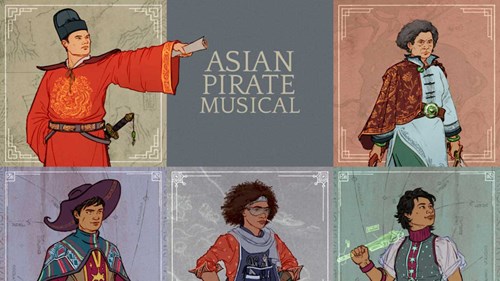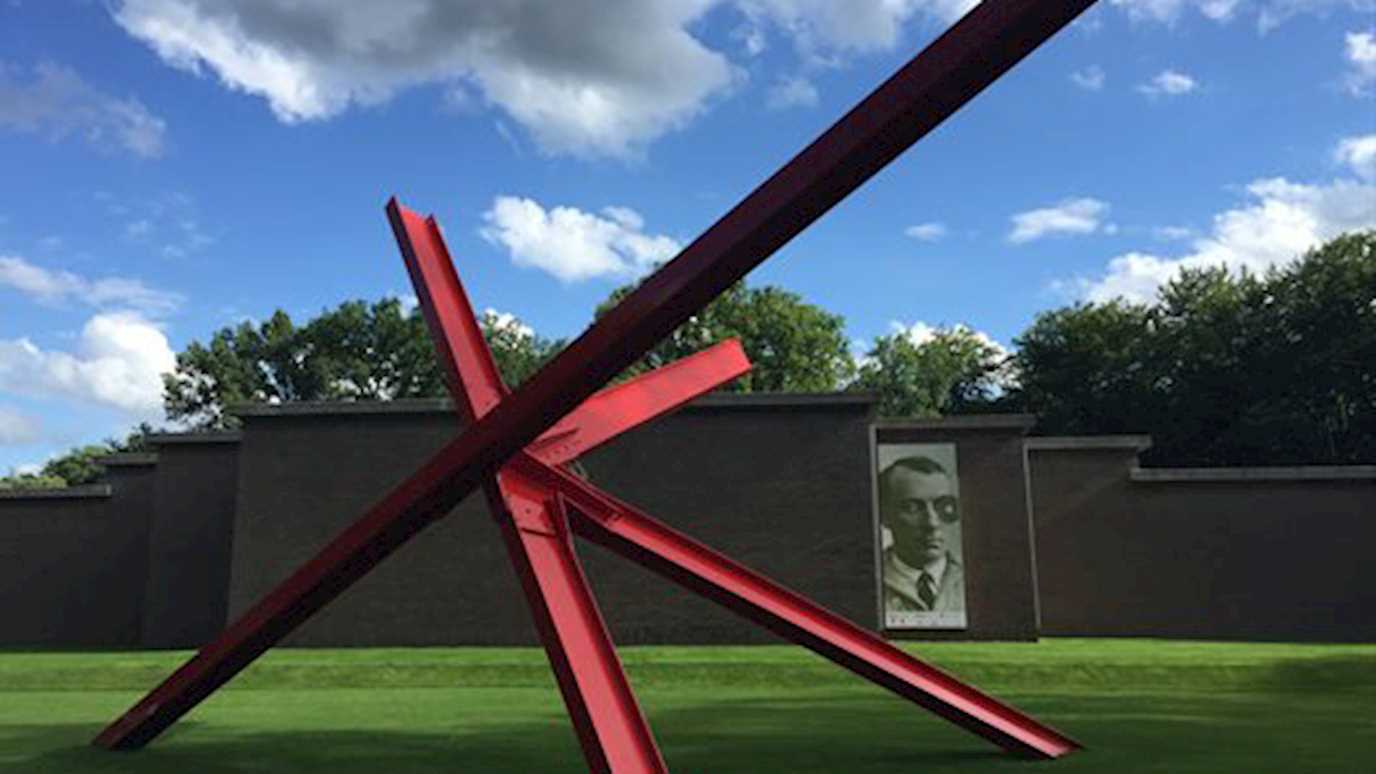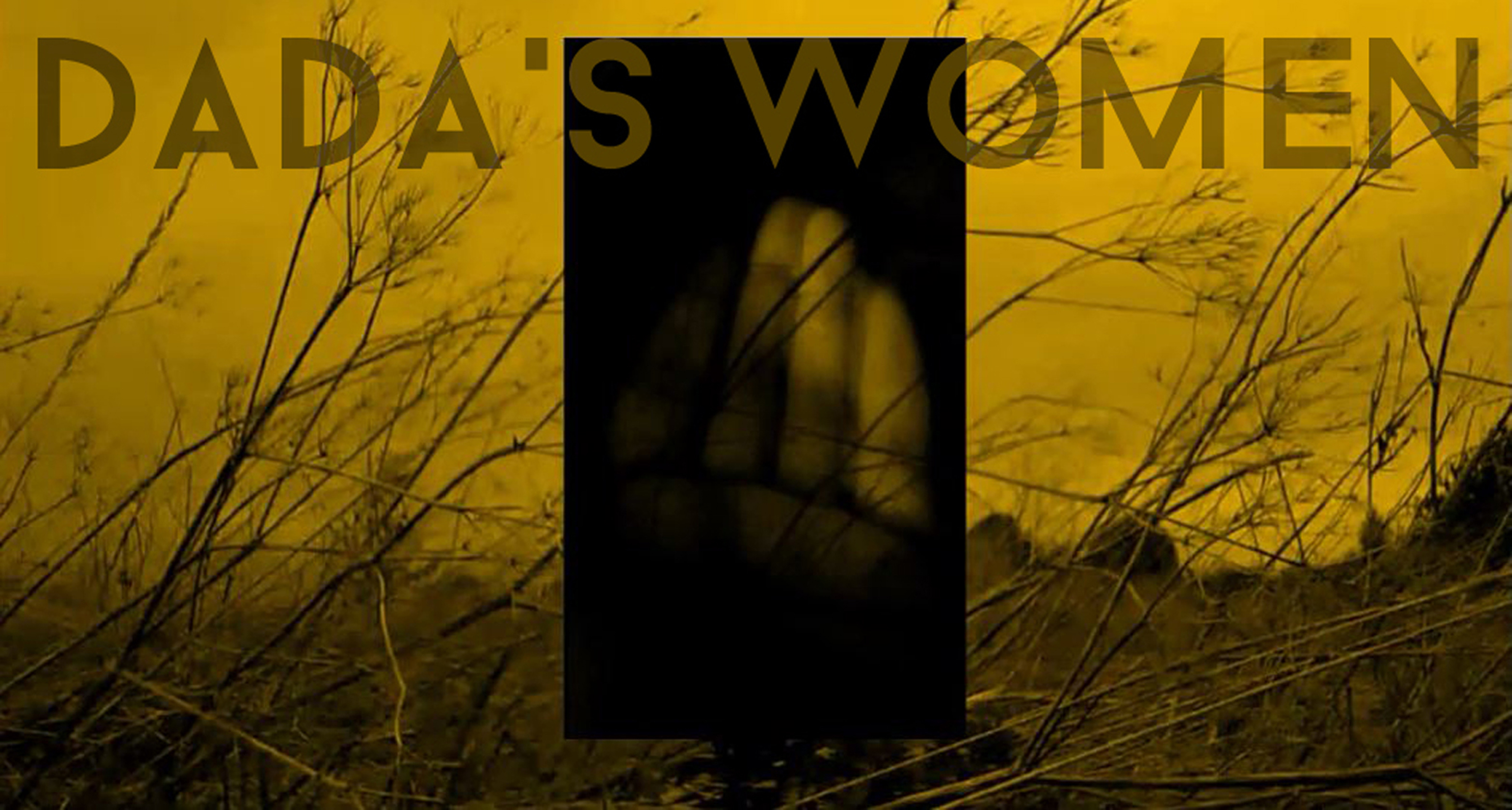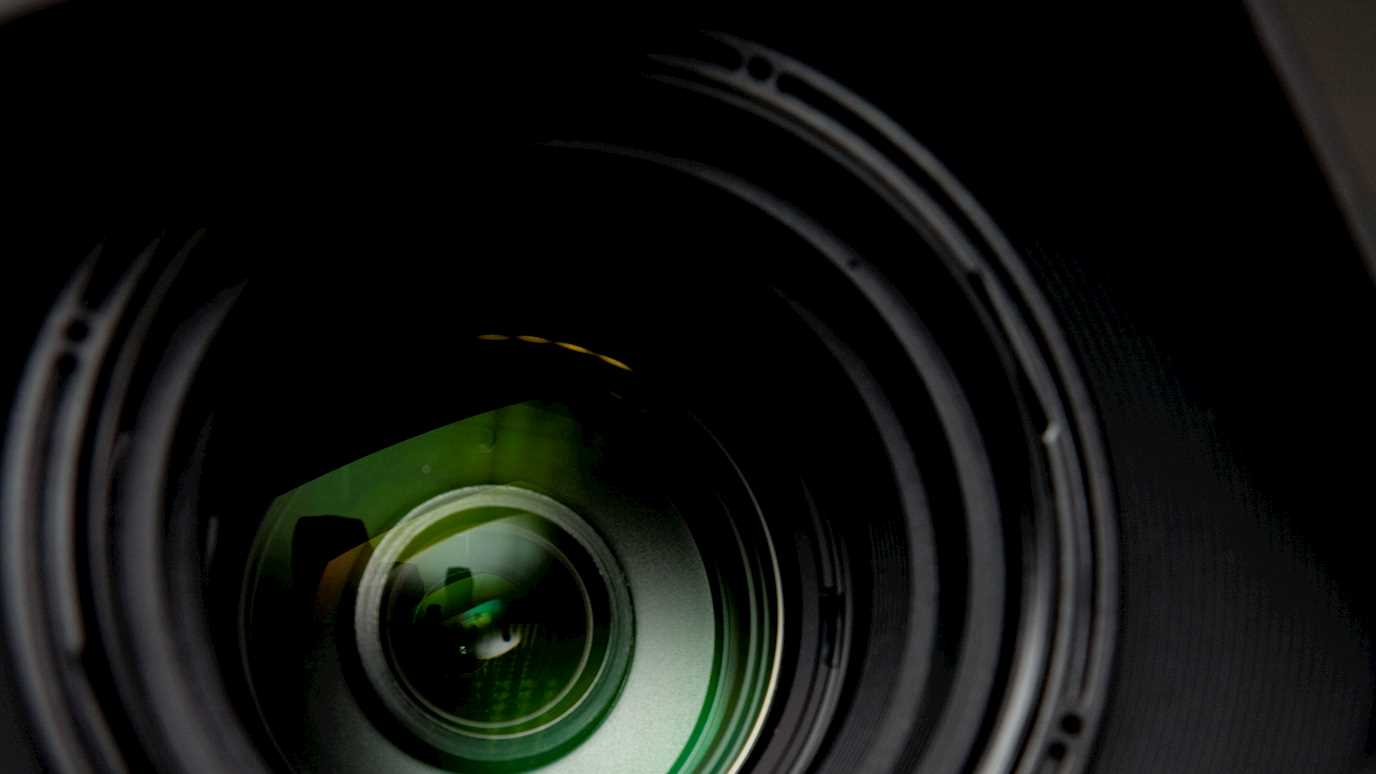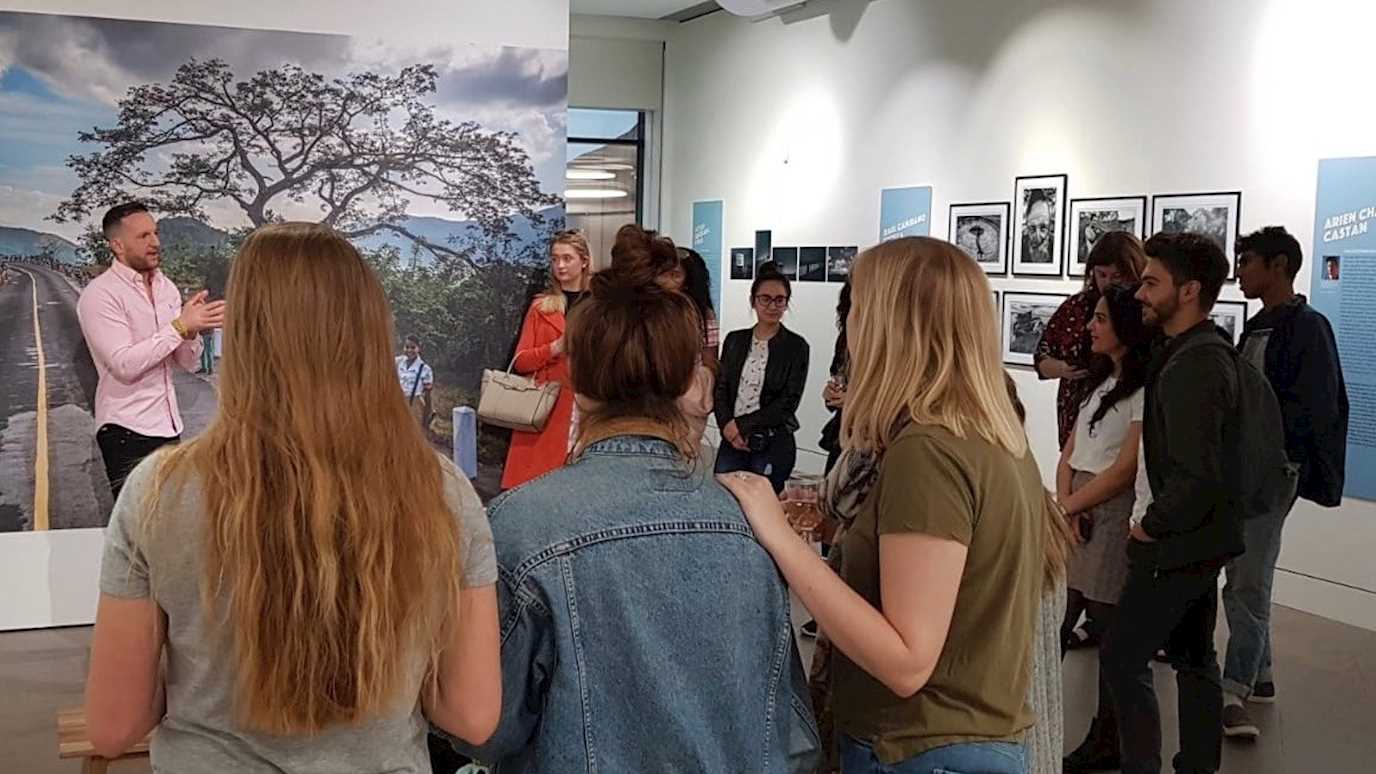The Centre for Visual Cultures sits within the Department of Languages, Literatures and Cultures. Find out more about the academics involved.
Image from Creating Audio Description online course developed by Professor Hannah Thompson: ‘Some people would describe this as an image showing a person covering first their ears, then their eyes, then their mouth with their hands. Other people would say it shows a woman, a black woman or a young black woman. The questions these choices raise are the focus on this course.’
Professor James S Williams
Professor of Modern French Literature and Film
James is a Professor of French/Francophone cinema and literature as well as Director of the Centre for Visual Cultures.
‘My research focuses on contemporary film, literature and thought, with a particular interest in questions of ethics and aesthetics; race, migration and transnational cultures; gender and sexuality; and space, urban studies and cultural geography. My published work includes The Erotics of Passage: Pleasure, Politics, and Form in the Later Work of Marguerite Duras (1997), Jean Cocteau (2006 and 2008), Space and Being in Contemporary French Cinema (2013), Encounters with Godard: Ethics, Aesthetics, Politics (2016), and Ethics and Aesthetics in Contemporary African Cinema: The Politics of Beauty (2019). Recent publications include the edited volume Queering the Migrant in Contemporary European Cinema (2020) and an article (2021) on Steve McQueen’s Small Axe.My study of Ousmane Sembene's 1974 film Xala will be published in the BFI Film Classics series in early 2024.'
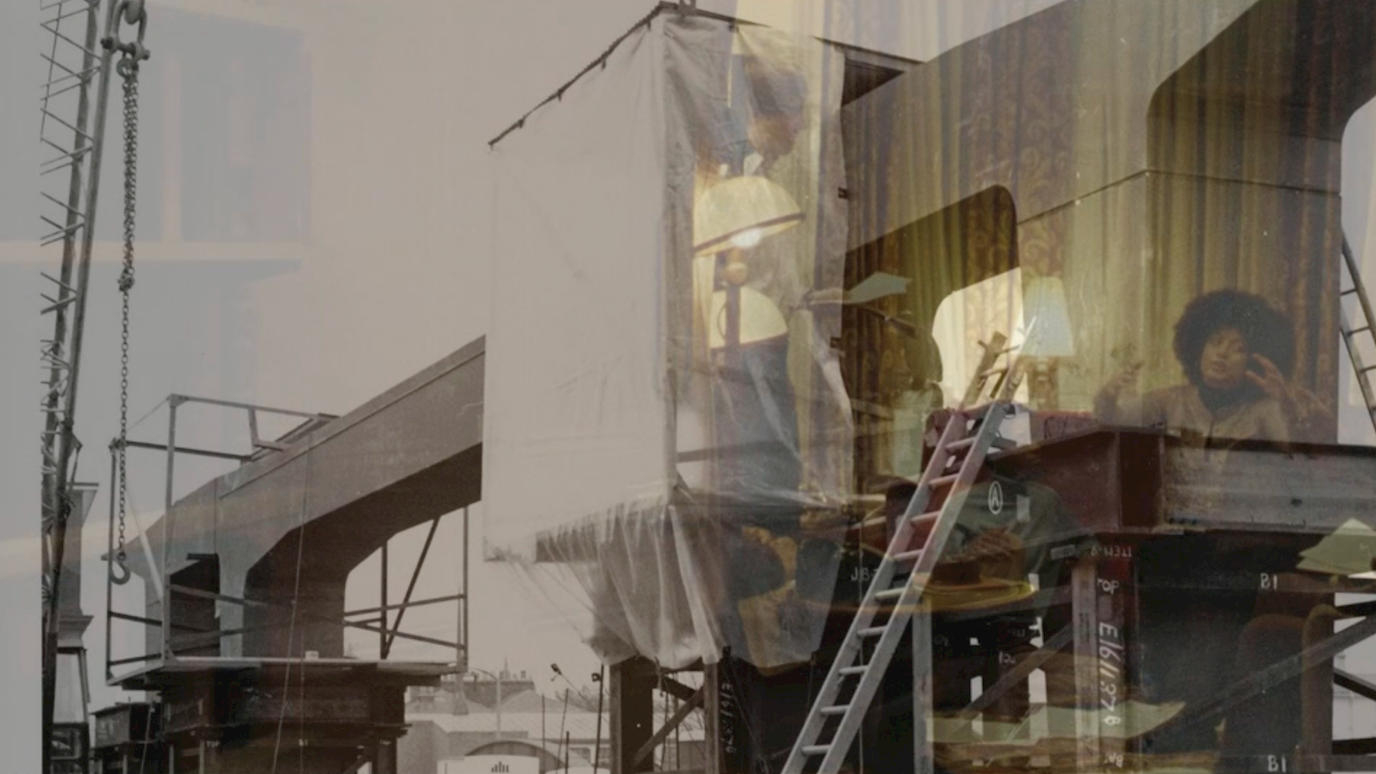
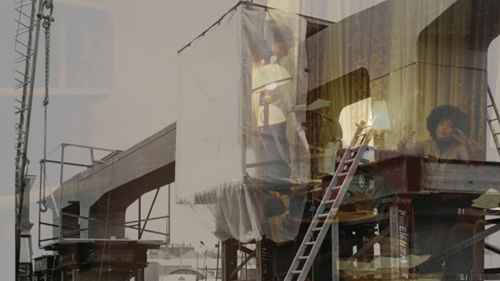
Image (a frame-grab) shows a ‘Mangrove 9’ political meeting dissolving into the Westway collage sequence in Mangrove, part of the BBC series Small Axe (2020) by Steve McQueen.
Professor Giuliana Pieri
Professor in Italian and Visual Arts
Professor Giuliana Pieri is the Head of School of Humanities. She has published widely on 19th and 20th century visual culture, cultural history and popular literature.
Her research interests are firmly in the area of comparative and interdisciplinary studies, especially the intersection of the verbal and the visual, and the role of Italian visual culture in the construction of Italian identity both in Italy and abroad.
Read Giuliana’s profile
Professor Eric Robertson
Professor of Modern French Literary and Visual Culture
Eric has published extensively on the French and European literary and artistic avant-gardes. His work on the artist, poet and sculptor Hans Jean Arp led him to co-curate the international exhibition Arp: the Poetry of Forms, which attracted 250,000 visitors to Kröller-Müller Museum, Otterlo, Netherlands, and Turner Contemporary, Margate in 2017-18. He also co-authored the accompanying book.
Additionally, he has worked with art galleries and museums including Almine Rech Gallery (New York), Arp Museum (Rolandseck), Cabaret Voltaire (Zurich), Connaught Brown (London), Hauser & Wirth (London, Los Angeles, New York and Zurich), Musée d’Art Moderne et Contemporain (Strasbourg), Nahmad Contemporary (New York) and Stiftung Arp (Berlin).
Eric has recently been invited by the Courtauld Institute to talk on the writer Blaise Cendrars. The event took place on February 7th 2022 and focussed on Cendrars’s collaborations with artists Sonia Delaunay and Fernand Léger. You can watch the whole talk here:
Professor Sarah Wright
Professor of Hispanic Studies and Screen Arts
Sarah has research interests in Spanish cinema, theatre and comparative literature as well as Chilean cinema and culture. She has worked on a translation of Lorca’s Blood Wedding with playwright David Ireland and disabilities company Graeae. Sarah delivers regular workshops for A level students of Spanish at the British Film Institute. In the past she was PI for a Leverhulme network of scholars working on Childhood and Nation in World Cinemas and is currently part of a project at the Consejo Superior de Investigaciones Científicas in Seville to research art and activism. Sarah is Senior Associate Editor of the Bulletin of Spanish Studies and the sibling journal, the Bulletin of Spanish Visual Studies.
Professor Hannah Thompson
Professor of French and Critical Disability Studies
Hannah is a specialist in nineteenth- and twentieth-century French literature and the visual arts, translation studies and audio description.
‘I am a partially blind academic and activist. I am interested in what the treatment of various protected characteristics (such as gender, sexuality and disability) can tell us about French culture. I have written three books on these themes: Naturalism Redressed: Identity and Clothing in the Novels of Emile Zola (Legenda 2004); Taboo: Corporeal Secrets in Nineteenth-Century French Fiction (Legenda, 2013) and Reviewing Blindness in French Fiction (1789-2013) (Palgrave, 2017). This third book marked the beginning of a new research focus on the intersections between Critical Disability Studies and French Studies. I am currently working on creative audio description in museums, art galleries and theatres and the notion of ‘blindness gain’ and I have an AHRC Equality, Diversity and Inclusion Fellowship to support this work on ‘Inclusive Description for Equality and Access’.
I write about my experiences as a partially blind person in a resolutely visual world on my blog Blind Spot.’
Current projects
‘Découvrir la peinture par l’écoute’ with the musée du quai Branly, Paris
Royal Holloway Picture Gallery Audio-Described Tour
AHRC EDI Fellowship: Inclusive Description for Equality and Access
Professor Ruth Hemus
Professor in French and Visual Arts
As well as being a founding member of the Centre for Visual Cultures, Ruth is Director of the Humanities and Arts Research Institute.
‘My research interests are in comparative treatments of radical women artists, writers and performers that span geographies and genres, moments and movements. My specialism is the European avant-garde, specifically Dada, and I am author of the monographs Dada’s Women (Yale University Press, 2009) and The Poetry of Céline Arnauld: From Dada to Ultra-Modern (Legenda, 2020).
I have worked with public institutions including The National Theatre, Southbank Centre and Tate Exchange in London, Hatton Gallery in Newcastle and Wasps Studio in Glasgow. Beyond the UK, I have collaborated on exhibitions, catalogues and events in Denmark, Italy, Switzerland, and Norway. My work formed an Impact Case Study for REF 2021 entitled ‘Dada's Women: Legacies at the Dada Centenary and Beyond’.’
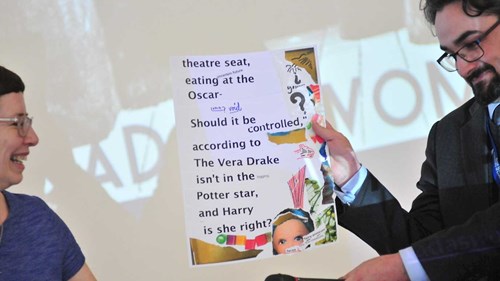
Image shows Professor Ruth Hemus at one of the creative and collaborative events organised with Sonia Allori and Vaia Paziana. See the Dada’s Women website.
Image credit: Andrew Mitchell.
Dr Jon Hughes
Reader in German and Cultural Studies
Jon is a specialist in modern German and Austrian film, literature and print media with a particular interest in the Weimar Republic, the anti-Fascist exile and Nazi Germany. He also researches the history of sport and cultural responses to sport and leisure in the German-speaking countries. In 2017 he published an interdisciplinary monograph on the cultural, social and political significance of the legendary German boxer Max Schmeling (1905-2005), examining a broad range of textual and visual media. In his current research he is investigating the representation of leisure in German literature and film.
Dr Ruth Cruickshank
Reader in French and Comparative Literature and Culture
Ruth’s research brings together her interests in food culture, consumer culture, globalisation and postcolonial marketplaces. Using an innovative critical concept - ‘leftovers’ - which draws on theoretical concepts which use or are legible through food and drink, she draws out the untapped critical potential of representations of food and drink in literature and cinema.
She has published widely interpreting images of food and consumption in French films including Sylvain Chomet, Les Triplettes de Belleville/Belleville Rendezvous (2003); Claire Denis, Chocolat/Chocolate (1988); Marco Ferreri, La Grande bouffe/The Big Feast (1973); François Truffaut, Les 400 coups/The 400 Blows (1959); Michael Haneke,Caché/Hidden (2005); Jean-Pierre Jeunet, Le Fabuleux destin d’Amélie Poulain/Amélie; Luc Moullet, Genèse d’un repas/The Origins of a Meal (1978); Agnès Varda, Les Glaneurs et la glaneuse/The Gleaners and I (2000) and L’Opéra-Mouffe/Diary of a Pregnant Woman (1958).
Her future research plans include bringing the concept of ‘leftovers’ to bear on an intermedia exploration of the untapped meanings bound up with representations of food and drink in French still-life painting and photography.
Read her profile
Dr Fabrizio de Donno
Senior Lecturer in Italian Studies
Fabrizio’s interdisciplinary research crosses literature and intellectual history and is firmly rooted in postcolonial studies.
He is the author of Italian Orientalism: Nationhood, Cosmopolitanism and the Cultural Politics of Identity (2019) and has published extensively on British and Italian colonial cultures and racial ideologies. He has also worked on contemporary Italian fiction and has an interest in literary and cinematic representations of migration. Fabrizio is currently working on a new comparative project on Exophonic literature in English and Italian.
Dr James Clifford Kent
Senior Lecturer in Hispanic Studies and Visual Cultures
Dr James Clifford Kent is a photographer and lectures on visual culture.
‘In my creative practice, I use portraiture and social documentary to explore ways of telling stories about people and the places/spaces they inhabit. Over the course of the past two decades, I have travelled regularly to Cuba with different practice-led research projects that have resulted in several articles on visual culture and the book Aesthetics and the Revolutionary City: Real and Imagined Havana (Palgrave Macmillan, 2019). I have curated group shows and exhibited my work in the UK and Cuba. Recent curatorial projects include This is Cuba: Documentary Photography after Fidel (Royal Holloway, 2019) and Raúl Cañibano: Chronicles of an Island at (The Photographers’ Gallery, 2019). My latest project explores the impact of the Covid-19 pandemic on pregnancy, birth and early parenthood. My work has been supported by Arts Council England, the Arts & Humanities Research Council, and the Global Challenges Research Fund. I have organised workshops and given public talks at institutions such as Tate Exchange, The Photographers’ Gallery and the Fototeca de Cuba.’

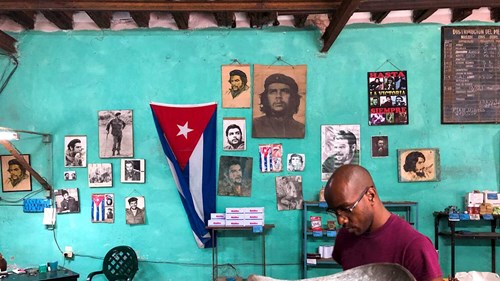
Image taken from the exhibition This Is Cuba and featured on James’s personal website.
Dr Arantza Mayo
Senior Lecturer in Hispanic Studies
Arantza specialises in Golden Age literature and culture in Spain and colonial America, particularly religious poetry, its devotional background and the relationship between literature and the visual arts. Recent publications include essays on Spanish Golden Age, colonial and 20th-century Spanish American poetry, book ownership in 17th-century Spain and the translation and reception of Cervantes's work in Britain.
Her current research interests include narratives of the Passion (textual and visual), the works of Teresa de Jesús, and pilgrimage.
Read Arantza’s profile
Dr Danielle Sands
Senior Lecturer in Comparative Literature and Culture
Danielle's interdisciplinary research draws upon interests in animal studies, ecocriticism, aesthetics and philosophy of religion. She is currently completing a monograph, Animals, Plants, Things: Nonhuman Storytelling between Philosophy and Literature for the 'Crosscurrents' series at Edinburgh University Press.
She is a Fellow at the Forum for European Philosophy at the LSE, where she organises 10 events annually.
Read Danielle’s profile
Dr Rachel Scott
Lecturer in Hispanic Studies and World Literature
Rachel is Lecturer in World and Hispanic Literatures
‘My research centres on the literary and textual cultures of the medieval and early modern Iberian worlds and its contact zones (medieval Middle East, Ottoman Empire, and New World). I draw on the history of the book, translation and reception studies, and cultural and intellectual history to consider the intersections between ‘Spanish’ literature, culture, and thought and those of other languages, such as Arabic, Hebrew, and Turkish as well as Italian, French, and English.
I am author of Celestina and the Human Condition in Early Modern Spain and Italy (Tamesis, 2017), and co-editor of Al-Andalus in Motion: Travelling Concepts and Cross-Cultural Contexts (KCLMS, 2021). My current project traces the medieval and early modern European transmission of Kalila wa-Dimna, a famous collection of eastern moral fables. I am also interested in contemporary representations and ideological appropriations of the medieval and early modern – an interest I have been developing through collaborations with artists, curators, and practitioners in the creative sectors, such as the P21 Gallery of contemporary Arab art and culture, and East London Textile Arts, a textile collective based in Newham, East London.
I am currently collaborating with the P21 Gallery, UK and international artists and curators, arts organisations (East London Textile Arts, Play for Progress), and schools on an Arts Council England-funded project about Kalila wa-Dimna in the contemporary world.

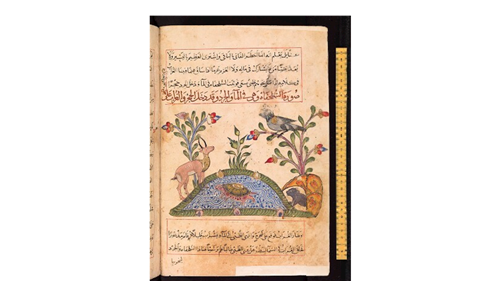
Illustration from an Arabic copy of Kalila wa-Dimna, 1354; fol. 90b, MS. Pococke 400, Bodleian Library, Oxford.
Dr Carlotta Paltrinieri
Lecturer in Early Modern Italian Studies and Director of Italian
Carlotta's research interests lie at the intersection of intellectual and social history, artistic literature, and visual culture.Her most recent publications focus on the sociological analysis of Italian art academies, and on a study of the rhetoric of early modern newsletters. Carlotta is also interested in exploring digital approaches to the study of art history, intellectual history, and literature.
Before joining Royal Holloway, Carlotta was the Assistant Director of the Medici Archive Project, and Senior Researcher in the programme ‘Towards a National Collection’, funded by the UK Arts and Humanities Research Council. She has held research fellowships at University College Cork, the Bibliotheca Hertziana-Max Planck Institute for Art History, and at the Institute of Modern Languages Research.
Dr Marion Joassin
Language Tutor in French
Marion specialises in author legacies and media history. Since her doctoral thesis (2011-2014, MIC Limerick funding award) on the media image of the playwright and poet Casimir Delavigne (1793-1843), she has developed skills in photographing 19th-century manuscripts and authentic letters written by famous artists and political figures of the time. She is also interested in how fashion from the Romantic era is depicted in the press.
In 2015, she participated in the organisation of the conference ‘Voyage’ on la Bande Dessinée, which was the Sixth International Graphic Novel and Comics Conference and Ninth International Bande Dessinée Society Conference.
She contributed to the online exhibition ‘Napoleon’s last stand: Popular Reactions to Napoleon’s 100 days in Print, Satire, Song and Theatre’ (Warwick Digital Humanities). Her contribution ‘Delavigne praising Napoleon’ can be found here.
Drawing is one of her hobbies.
Dr Lili Owen Rowlands
Leverhulme Early Career Research Fellow in French
I am a Leverhulme Early Career Research Fellow in the Department of Languages, Literatures and Cultures. My research focuses on modern and contemporary French literature, film and critical theory, with an emphasis on questions of autobiography, sexual dissidence, gender and precarity. My current project examines what contemporary French first-person texts and films reveal about disparaged, dangerous and overlooked forms of work at a time when life and labour have become increasingly enmeshed. I’m especially interested in the work of cleaning, caring and sex working.
Dr Hilary Potter
Honorary Research Associate
Hilary is a specialist in German cultural memory and identity. Her current project focuses on the Weimar Republic and its contemporary resonances. She also works on representations of the 1943 Berlin Rosenstrasse Protest, publishing her first monograph Remembering Rosenstrasse: History, Memory, Identity in Contemporary Germany with Peter Lang, Oxford in 2018, and most recently on remembering in an age of right-wing populism.
Dr Anissa Talahite-Moodley
Honorary Research Associate
Anissa is an Independent Researcher and Honorary Research Associate at Royal Holloway. She is currently an Assistant Professor (Teaching Stream) in Women's and Gender Studies in the Department of Historical and Cultural Studies at the University of Toronto (UTSC). Read her profile here.
‘My research focuses on the ways in which contemporary postcolonial writers, filmmakers and artists are reshaping traditional discourses of home, nation and gender. I have looked at the dynamics of gender and self-representation in fiction by francophone authors such as Leïla Sebbar, Tassadit Imache, Farida Belghoul, Leïla Houari, Azouz Begag and Nadia Ghalem, as well as anglophone authors such as Nadine Gordimer and Bessie Head. I have also approached the significance of visual representations in the construction and deconstruction of the racialized and gendered ‘other’ by comparing the work of authors from different literary and cultural traditions, such as Ralph Ellison and Farida Belghoul. My interest in gender and representation has also led me to pay particular attention to the reconfiguring of masculinity in contemporary Algerian cinema (for example in Merzak Allouache’s classic film, Omar Gatlato). My publications include Problématiques identitaires et discours de l’exil dans les littératures francophones (Ottawa University Press, 2007), Gender and Identity (Oxford University Press, 2013), a special issue of Dalhousie French Studies on ‘Women from the Maghreb: Looking Back and Moving Forward’ (2014), as well as book chapters and journal articles on various aspects of the intersection of postcolonial and gender discourses as reflected in literature and cinema.’
Dr Judith Meddick
Honorary Research Associate
Judith is an Honorary Research Associate in the Department of Languages, Literatures and Cultures. She has worked as a consultant and researcher in the arts and design, for various organisations including the Arts Council, where she was commissioned to write a series of publications on arts marketing (revised for the Scottish Arts Council), and as a Senior Lecturer in Contextual Studies. She did her PhD at Royal Holloway, with a thesis on the memory of the Spanish Civil War and Francoist past in the contemporary Spanish novel: ‘My research centres on cultural memory and trauma and the concepts of haunting, mourning and ethics. Focusing on novels by authors who were born and grew up under Francoism in the generations after the war, I explored how they represent and return knowledge of the Civil War and post-war past. In particular, I traced how such fictional works of memory contribute to the construction of a collective cultural memory of the Civil War by representing it as such: through writing and cultural production. Other facets include the politics of memory in terms of language/region in Spain, and the trans-national reach of the texts. I have published ‘The Telling of Memory in La sombra del viento by Carlos Ruiz Zafón’ (Romance Studies, 2010) and am currently revising the thesis for publication.’
Anna Price
Doctoral Researcher
Anna is a PhD student in the departments of English and History at Royal Holloway. Her thesis, ‘Representations of rowing in the long nineteenth-century literary and visual arts’, will explore the social, spatial and gendered dynamics of rowing and how these elements are manifested in Victorian literature and art.
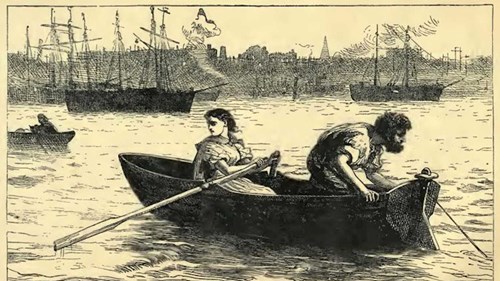
Image is the frontispiece illustration by Marcus Stone for Dickens's Our Mutual Friend, entitled 'Bird of Prey' and accessed via Project Gutenberg. Image shows Lizzie and Gaffer Hexham in a row boat on the Thames. Lizzie is holding an oar and looks back over her shoulder while Gaffer peers into the water at the front of the boat. The background depicts London's working river.
Martina Borghi
Doctoral Researcher
Martina is a PhD researcher in Italian.
‘My PhD aims to formulate a comprehensive analysis of the role of the observer in Italian kinetic and programmed artworks, as well as of the concept of programming itself, whose existence is entwined with the observer’s interaction. This research dissects the relationships between the observer, the programming activity and the role of dynamism from different points of view to widen its multidisciplinary approach. More generally, I have a keen interest in the Italian cultural history of the Sixties and in the key figure of Bruno Munari. In these years at Royal Holloway I have had the opportunity to collaborate in the creation of new teaching experiences to combine the study of the Italian language with that of the visual arts, as well as in the development of new teaching methods that are characterised by an approach linked to artistic curatorship.’
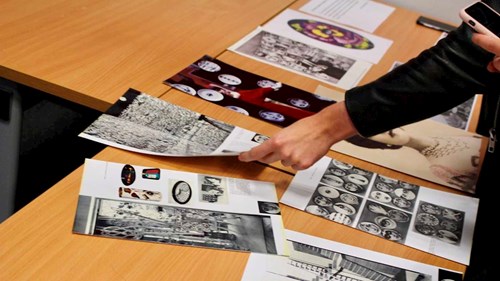
Matthew Collyer
Doctoral Researcher
Matt is writing his PhD thesis on the relationship between visual cultures and philosophies of becoming.
Katherine Devine
Doctoral Researcher
Kate is writing her PhD thesis on the expressions of craft in Italian avant-garde art and design from the 1960s and 1970s.
Katie Docwra
Doctoral Researcher
Katie is a final year PhD researcher in French and a member of the Centre for Visual Cultures.
'My research looks at the representation of women’s experience in two films written and directed by Paula Delsol. A woman filmmaker working in France from the 1950s to the 1970s, with significant contributions to both the French film and television industry, Delsol has been strikingly overlooked in current accounts of French women’s film. Drawing on major French socio-political and cultural discourses and feminist (film) theory, I seek to elucidate how Delsol portrays women in film by investigating her filmic treatment of women’s reproductive futures, her portrayals of women’s work and the representation of feminine gender identity through her unique aesthetic style, formal language and story-telling.’

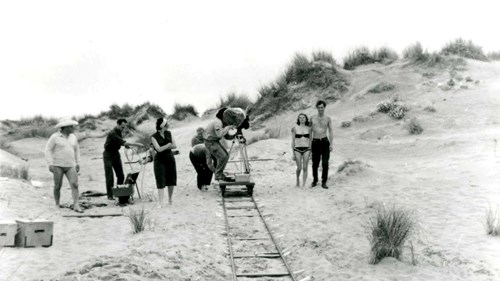
Copyright André Guite, circa. 1962. Courtesy of Bernard Bastide. Image is a black and white photograph taken during location shooting of a scene in Paula Delsol’s La Dérive, circa. 1962. The image shows a film crew on a rugged beach covered in dunes: a dolly track set up on the sand divides the frame. Towards the top of the image, the actors are on the right of the frame, walking side-by-side in conversation. On the left, a male camera operator looks throught the viewfinder of the camera at the actors. Behind him, Paula Delsol is standing close to the camera, directing the shot. Behind Delsol is the sound operator holding a microphone, standing next to another man who is observing.
Ilham Essalih
Doctoral Researcher
Ilham is writing her PhD thesis on madness and colonialism in African literature.
Caroline Harris
Doctoral Researcher
Caroline is a PhD researcher in Poetic Practice.
‘My PhD focuses on the poetics of deer – I’m looking at what we do when we put deer in poems, and how that relates to the ways people view real deer. I am interested in material poetries, ecological philosophy, the poetry of Joy Harjo, Alice Oswald and Pascale Petit, and the growing field of Cute Studies. I am co-organiser of AWW-STRUCK: Creative and Critical Approaches to Cuteness. Recent work includes the poetry pamphlets SCRUB Management Handbook No.1 Mere (Singing Apple Press), Type Flight and Cut-out Bambi (Small Birds Press), the article ‘Movable Type: Birds, Thoughts, Print’ (in The Blue Notebook: Journal for Artist’s Books), and Clootie Ribbons [Rhodes series], exhibited in the Text-Isles show at the Art Park Gallery, Rhodes. You can watch/listen to my paper for the September 2021 British Animal Studies Network conference on video and also hear an audio description of Cut-out Bambi.’

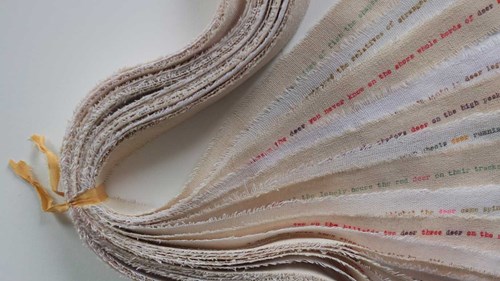
Image shows Clootie Ribbons [Rhodes series], a set of frayed-edge linen ribbons typed in different colours with lines from the poem A Summoning Spell for Lost Deer (Caroline Harris, 2021).
Renee Landell
Doctoral Researcher
Renee is writing her PhD thesis on the representation of Caribbean slavery in contemporary fiction.
Ash Finn
Doctoral Researcher
Ash is writing his PhD thesis on philosophy and psychoanalysis, in particular the logic of fantasy as presented by Lacan in his fourteenth seminar.
Nemo Martin
Doctoral Researcher
Nemo (they/them) is a PhD researcher writing their thesis on positive representations of non-white, non-cisgender identity in adaptations and fanwork of Victor Hugo’s Les Misérables.
‘I am a nonbinary writer and freelance theatre-maker. My interest lives in the intersections between colonial formations of race and gender in the nineteenth century, the history of the natural sciences, and the legacies of both in online fandom culture. My debut play, The Cobbled Streets of Geneva, won an Origins Award for outstanding new writing and my first collaborative musical Asian Pirate Musical sold out at VAULT Festival 2020.’
@zeus_japonicus
Image shows a poster for Asian Pirate Musical. Drawn by Charis Loke.
Polly Hember
Doctoral Researcher
Polly is writing her PhD thesis on the modernist network the POOL group, and how their fiction and film work engaged with cultures of modernity. She has work forthcoming in Modernist Cultures and Hotel Modernisms 1890-1950 (Routledge), edited by Anna Despotopoulou, Vassiliki Kolocotroni & Efterpi Mitsi.

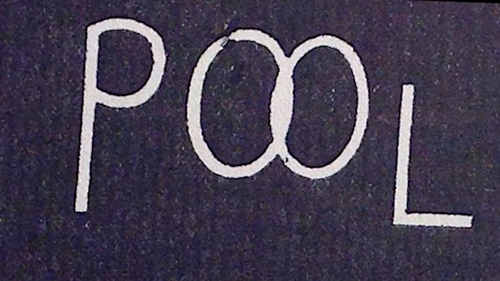
Polly currently co-hosts the techne podcast and has previously acted as a postgraduate representative for the British Association of Modernist Studies and co-editor of the Modernist Review. More broadly, Polly is interested in queer theory, studies on affect and emotion, technology and early twentieth century writing. Her research profile can be found here and her twitter here.
Image description: the POOL group’s logo, with the word POOL in white on a dark blue/grey background.
Gareth Hughes
Research Centre Associate and Doctoral Researcher
Gareth's PhD thesis examines the multi-sensory and intermedial poetry of Christophe Tarkos. His research is funded by the Techne AHRC consortium.
He is the current Research Centre Associate for the CVC. He is host and editor for the CVC Podcast series Uncovered
Selene Genovesi
Language Tutor
Selene has an MA in Translation achieved at University of Exeter and is currently a PhD student in Comparative Literature at University of Kent, focusing on multilingual writing in Italy and Spain during the years of dictatorships. Her main interests are related to the translation of regional varieties, the use of dialect in literature and, more recently, theatre in translation. She is a language tutor at Royal Holloway University of London and a freelance translator.
Advisory Board
Our Advisory Committee and Honorary Research Fellows
Advisory Committee:
Prof Daniela Berghahn (Media Arts, RHUL)
Tamsyn Challenger (artist) Read profile
Prof Jane Davison (Management, RHUL)
Prof Harriet Hawkins (Geography, RHUL)
Dr Laura MacCulloch (Head of Collections and Exhibitions at the Watt's Gallery-Artists' Village, Surrey)
Dr Emanuela Patti (Lecturer in Italian at the University of Edinburgh) Read profile
Dr John Perivolaris (Photographer) Read profile
Dr Henry Somers-Hall (Philosophy, RHUL)
Prof Joanna Zylinska (Professor of Media Philosophy and Critical Digital Practice at King's College London) Read profile
Honorary Research Fellows:
Dr Stefano Jossa (University of Palermo) Read profile
Dr Lidia Merás (Universidad Autónoma de Madrid)










